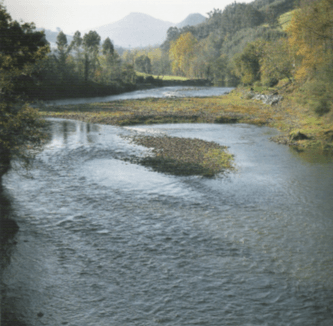Pas (river) facts for kids
Quick facts for kids Pas |
|
|---|---|
 |
|
| Country | Spain |
| State | Cantabria |
| Region | Pas valley, Santander bay |
| Physical characteristics | |
| Main source | Castro Valnera 1,200 m (3,900 ft) |
| River mouth | Ría de Mogro Santander bay, Bay of Biscay 0 m (0 ft) |
| Length | 57 km (35 mi) |
| Basin features | |
| Basin size | 649 km2 (251 sq mi) |
| Tributaries |
|
The Pas River is a beautiful river located in the region of Cantabria in northern Spain. It flows entirely within the autonomous community of Cantabria. This river is an important part of the landscape and history of the area. It eventually flows into the Cantabric Sea, which is part of the Bay of Biscay.
Contents
Journey of the Pas River
Where the Pas River Starts
The Pas River begins its journey high up in the mountains. Its source is in a place called Castro Valnera. This spot is about 1,200 meters (3,900 feet) above sea level. Imagine starting your adventure from such a high point!
How Long is the Pas River?
The Pas River flows for about 57 kilometers (35 miles). That's like traveling the distance of many soccer fields end-to-end! Along its path, it collects water from a large area. This area is called its river basin. The Pas River basin covers about 649 square kilometers (251 square miles).
Where the Pas River Ends
After its long journey, the Pas River reaches the sea. It empties into the Ría de Mogro. This area is a special kind of estuary, where fresh river water mixes with salty ocean water. The Ría de Mogro is part of the Santander Bay, which opens into the Bay of Biscay.
Rivers Joining the Pas
Many smaller rivers and streams flow into the Pas River. These are called tributaries. On the left side, rivers like the Yera, Viaña, Magdalena, Jaral, and Barcelada join the Pas. On the right side, the Pandillo and the Pisueña add their waters. All these rivers help make the Pas flow strong.
Life Around the Pas River
The Pas River and its valley are home to many different plants and animals. The river's waters support various fish species. The surrounding areas, including forests and meadows, provide habitats for birds and other wildlife. This makes the Pas valley a rich natural environment.
Importance of the Pas River
The Pas River has been important to the people of Cantabria for a long time. It provides water for farming and supports local communities. The river also plays a role in the region's culture and history. Many towns and villages are located along its banks.
See also
 In Spanish: Río Pas para niños
In Spanish: Río Pas para niños
 | Lonnie Johnson |
 | Granville Woods |
 | Lewis Howard Latimer |
 | James West |

